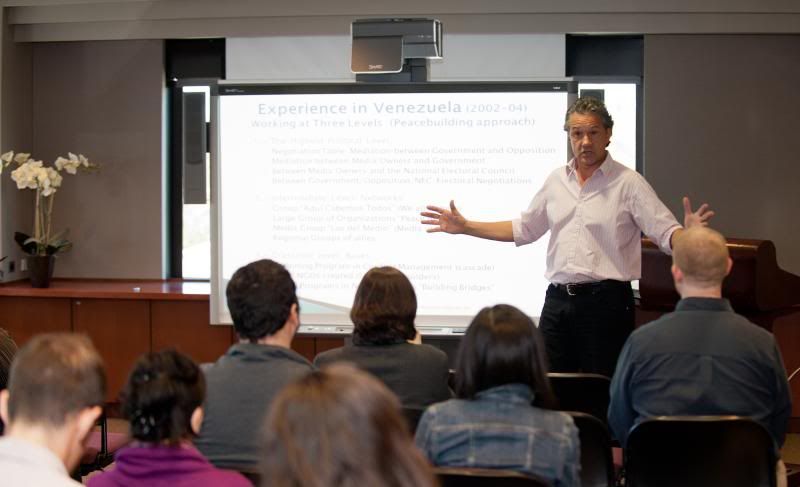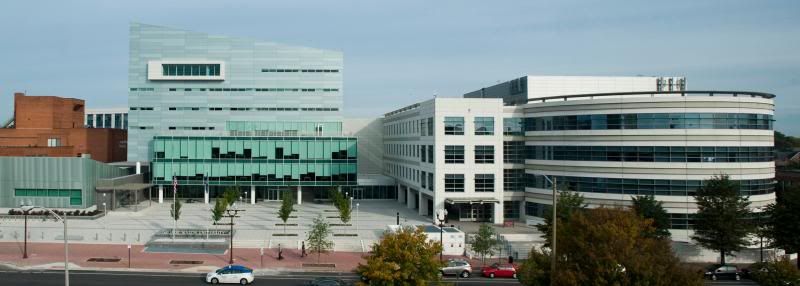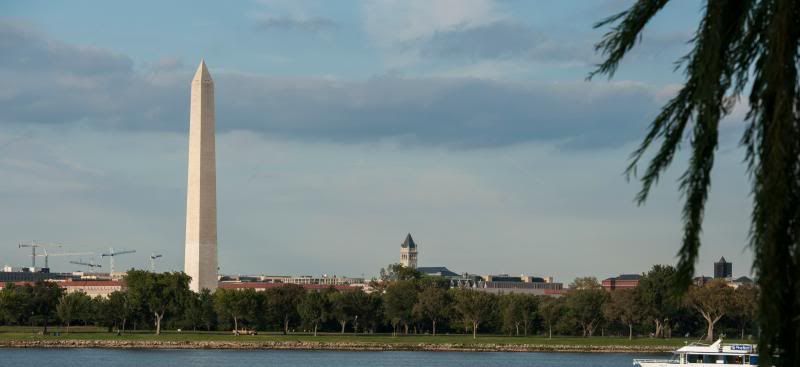
The Peacebuilding Fellows is a unique academic program for selected students interested in hands-on experience and applying classroom knowledge in the field. The semester-long academic program is based at Mason's Arlington campus and incorporates a significant internship experience.
The cohort will focus on both domestic and international communities struggling to live peacefully together. The small cohort of students will allow for more discussion and the opportunity to delve deeper into the issues.
The internship provides students the chance to immediately apply what they are learning and offers greater insight into future careers in areas relating to conflict analysis and resolution. Students will also be exposed to practitioners and experts in the field through the Speaker Series and receive assistance with their internship placement, along with career development support.

Students are enrolled in 3 academic courses focusing on conflict theories and techniques, 3 credits of conflict resolution practice, and 3 credits of internship for a total of 15 credits. Students may opt out of one of the courses if they have previously taken and passed the courses.
CONF 302 - Culture, Identity, and Conflict
Covers deeply rooted, intractable, or protracted social conflicts around core issues of identity, including race, ethnicity, religion, and nationalism. Explores cultural, symbolic, and discursive approaches to identity conflict; fulfills writing intensive requirement in the major.
CONF 330 - Community, Group, & Organizational Conflict Analysis and Resolution
Introduces theories of social harmony and conflict, drawing on sociology, social psychology, community psychology, organizational psychology, administration of justice, philosophy, and conflict resolution. Uses case studies, class presentations, and group projects to develop ability to analyze conflict and make recommendations for change within communities, social groups, and organizations.
CONF 435 - Building Peace in Divided Societies
A major challenge to peacebuilding efforts domestically and globally are the boundaries that communities believe separates themselves from others. The boundaries have ethnic, racial, religious or cultural roots, often with long histories of division and violence. This class will look at case studies and strategies from around the globe of peacebuilding in complex communities.
CONF --- - Advanced Skills in Peacebuilding
Description coming soon!
Fieldwork
CONF 370 - Internship Field Experience
Internships will provide an opportunity for students to gain practical experience, reflect on those experiences, and apply academic theories outside of the normal classroom environment. See more information about internships below.
 Patricia A. Maulden is Associate Professor of Conflict Resolution and Director of the Dialogue and Difference Project with The School for Conflict Analysis and Resolution at George Mason University. She earned her Bachelor of Arts degree in Anthropology from the University of California, Santa Cruz and her Master of Science and Doctor of Philosophy degrees in Conflict Analysis and Resolution from George Mason University. Her research interests include generational and gendered dynamics of conflict and peace, social militarization / demilitarization processes, urbanization, post-conflict peace economies, and peacebuilding practices. She has written about child soldiers generally as well as, more specifically, the roles of girls and women in conflict – whether as soldiers, combatants, or associates of fighting forces. She is currently investigating the dynamics of NGOs as private peacebuilding contractors and their roles in the post-conflict peace economy, the post-conflict paradox – engaging war while creating peace, and exploring peacebuilding over time, more specifically the trajectories of post-conflict knowledge.
Patricia A. Maulden is Associate Professor of Conflict Resolution and Director of the Dialogue and Difference Project with The School for Conflict Analysis and Resolution at George Mason University. She earned her Bachelor of Arts degree in Anthropology from the University of California, Santa Cruz and her Master of Science and Doctor of Philosophy degrees in Conflict Analysis and Resolution from George Mason University. Her research interests include generational and gendered dynamics of conflict and peace, social militarization / demilitarization processes, urbanization, post-conflict peace economies, and peacebuilding practices. She has written about child soldiers generally as well as, more specifically, the roles of girls and women in conflict – whether as soldiers, combatants, or associates of fighting forces. She is currently investigating the dynamics of NGOs as private peacebuilding contractors and their roles in the post-conflict peace economy, the post-conflict paradox – engaging war while creating peace, and exploring peacebuilding over time, more specifically the trajectories of post-conflict knowledge.
.jpg) Douglas Irvin-Erickson is Fellow of Peacemaking Practice and Director of the Genocide Prevention Program. An expert on genocide and international law, he comes to the School for Conflict Analysis and Resolution from the Rutgers University Center for the Study of Genocide and Human Rights, where he served as the Director of Outreach (2007-2009), co-led genocide prevention projects for the Democratic Republic of Congo (2012-2013), conducted ethnographic research in Cambodia in connection to reconciliation and the Khmer Rouge Genocide Tribunal (2010), and conducted in-country research on political violence and reconciliation in Argentina (2009). His current research includes a book on the life and works of Raphael Lemkin, the originator of the word "genocide" who authored the UN Genocide Convention; and an co-edited volume titled, Violence, Religion, Peacemaking: Contributions of Interreligious Dialogue. He holds a Ph.D. in Global Affairs from Rutgers, The State University of New Jersey, and an M.A. in English Literature.
Douglas Irvin-Erickson is Fellow of Peacemaking Practice and Director of the Genocide Prevention Program. An expert on genocide and international law, he comes to the School for Conflict Analysis and Resolution from the Rutgers University Center for the Study of Genocide and Human Rights, where he served as the Director of Outreach (2007-2009), co-led genocide prevention projects for the Democratic Republic of Congo (2012-2013), conducted ethnographic research in Cambodia in connection to reconciliation and the Khmer Rouge Genocide Tribunal (2010), and conducted in-country research on political violence and reconciliation in Argentina (2009). His current research includes a book on the life and works of Raphael Lemkin, the originator of the word "genocide" who authored the UN Genocide Convention; and an co-edited volume titled, Violence, Religion, Peacemaking: Contributions of Interreligious Dialogue. He holds a Ph.D. in Global Affairs from Rutgers, The State University of New Jersey, and an M.A. in English Literature.

Lisa E. Shaw is the Director of Field Experience and Student Services with the School for Conflict Analysis and Resolution (S-CAR) at George Mason University. Ms. Shaw has twenty years of experience in experiential education and community-based programs at the international, national, and local levels. Her experience includes education, environmental stewardship and wildland firefighting as an inaugural member of Americorps-NCC, creating curriculums and traveling nature trunks for the Chattahoochee Nature Center, teaching for High Touch-High Tech, a hands-on learning program focused on strengthening national science standards, and directing primary and secondary after-school and summer programs for the City of Decatur Recreation Department. Ms. Shaw completed a Bachelor of Arts in Political Science, Philosophy, and Environmental Science at Regis University in Denver, Colorado and received a Master of Science degree in Conflict Analysis and Resolution from the Institute of Conflict Analysis and Resolution in Arlington, Virginia.
The internship is a key component of the Peacebuilding Fellows. The courses are conveniently scheduled to allow students ample time for an internship. This offers the student enhanced learning opportunities and makes them more of an asset for the host organization. Internships are also great networking opportunities for students to learn more about a specific field or gain contacts they can use in their future job search.
Students must spend at least 135 hours at their internship site before the end of the semester. Most students will intern two or three days a week.
Students obtain their own internships with the help and support of the program and Mason's Office of Career Services. Most internships will be unpaid, but students are also encouraged to pursue internships that offer a small stipend or a paid internship.
S-CAR students have interned at a variety of governmental and non-governmental organizations in the Great Washington Area. Organizations include:
- Alexandria Human Rights Office
- Booz Allen Hamilton
- Communities without Boundaries
- FACETS
- Fairfax County Depart
- ment of Neighborhood and Community Services
- FDIC Internal Ombudsman
- Human Rights Campaign
- International Peace and Security Institute
- Northern Virginia Mediation Services
- Polaris Project
- Search for Common Ground
- The Peace Alliance
- U.S. Department of Justice
- U.S. Department of State
- Washington Peace Center

- Cohort learning environment with discussion-based classes.
- Opportunity to complete a significant internship experience to gain new skills and network within the field.
- Classes on the Arlington campus provide greater access to S-CAR's intellectual community.
- Guest speakers give unique perspectives and insights from different practitioners, researchers, and professionals in the field.
- Students receive a transportation stipend for travel to the Arlington campus and their internship site.
- Career advising.
- Global Affairs students have the opportunity to complete a Minor in Conflict Analysis and Resolution in one semester as a Peacebuilding Fellow if they have completed CONF 101 and CONF 340.
"The Peacebuilding Fellows program forced me out of the classroom learning bubble and toward real worl experience." -Spring 2015 Fellow
"My favorite thing about the fellowship was being part of a small, tight-knit cohort." -Spring 2016 Fellow
Click here to read what two Peacebuilding Fellows alumni, Emily Allen and Corey Jefferson, have to say about their experience as Peacebuilding Fellows!
Application Deadline: October 14, 2016
Interested students of all majors are invited to apply for the Peacebuilding Fellows. While it is strongly recommended that students take at least one CONF course before applying, it is not required.
Students should meet the following requirements before applying to the Peacebuilding Fellows:
- Completion of at least 45 college credits by the start of the Spring 2017 semester
- A recommended cumulative GPA of 3.0
To apply, include the following in an email to [email protected]:
- Full name
- G Number
- 300-500 word statement about what you hope to gain from the Fellows experience
- Current resume
For additional information or questions about the program, please email Sarah Kincaid at [email protected].


